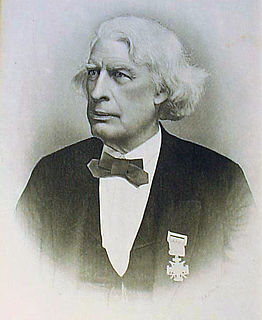A Quote by Adolf Hitler
Also noteworthy is the increasingly violent struggle against the dogmatic foundations of the various churches without which in this human world the practical existence of a religious faith is not conceivable.
Related Quotes
By helping to raise man above the level of bestial vegetation, faith contributes in reality to the securing and safeguarding of his existence. Take away from present-day mankind its education-based, religious-dogmatic principles- or, practically speaking, ethical-moral principles- by abolishing this religious education, but without replacing it by an equivalent, and the result will be a grave shock to the foundations of their existence.
My belief is that the various religious traditions have great potential to increase compassion, the sense of caring for one another, and the spirit of reconciliation. However, I believe that a human being, without religious faith, can be a very good person - sincere, a good heart, having a sense of concern for others - without belief in a particular religious faith.
The Cabal is of two kinds, theoretical and practical, with the practical Cabala, which is engaged in the construction of talismans and amulets, we have nothing to do. The theoretical is divided into the lineal and dogmatic. The dogmatic is nothing more than the summary of the metaphysical doctrine taught by the Cabalist doctors. It is, in other words, the system of the Jewish philosophy.
One can delineate the domain of philosophy however one likes, but in its search for truth, philosophy is always concerned with human existence. Authentic philosophizing refuses to remain at the stage of knowledge […]. Care for human existence and its truth makes philosophy a 'practical science' in the deepest sense, and it also leads philosophy—and this is the crucial point—into the concrete distress of human existence.
Most of what happens in the world is far beyond a dog's comprehension, so they must turn to their faith in us to help them navigate life's treacheries. Don't we, also, have unanswerable questions about the vagaries of modern existence for which the answer is beyond human grasp, so that only our faith can guide us?
Agnosticism is a perfectly respectable and tenable philosophical position; it is not dogmatic and makes no pronouncements about the ultimate truths of the universe. It remains open to evidence and persuasion; lacking faith, it nevertheless does not deride faith. Atheism, on the other hand, is as unyielding and dogmatic about religious belief as true believers are about heathens. It tries to use reason to demolish a structure that is not built upon reason.
There could be no more powerful argument against mixing religion and government than the success of independent African American churches in placing racial segregation and discrimination on a reluctant nation's social agenda. Would black churches have been able to take the lead in the struggle had they been dependent on funds doled out for 'faith-based initiatives' . . . ?
Wherever applause breaks out in the liturgy because of some human achievement, it is a sure sign that the essence of liturgy has totally disappeared and been replaced by a kind of religious entertainment. Such attraction fades quickly - it cannot compete in the market of leisure pursuits, incorporating as it increasingly does various forms of religious titillation.
Others, one suspects, are afraid that the crossing of space , and above all contact with intelligent but nonhuman races, may destroy the foundations of their religious faith . They may be right, but in any event their attitude is one which does not bear logical examination for a faith which cannot survive collision with the truth is not worth many regrets.
There comes a time in the affairs of men when they must prepare to defend not their homes alone but the tenets of faith and humanity on which their churches, their governments and their very foundations are set. The defense of religion, of democracy and of good faith among nations is all the same fight. To save one, we must now make up our minds to save all.
Sören Kierkegaard has another answer: human existence is possible as existence not in despair, as existence not in tragedy; it is possible as existence in faith... Faith is the belief that in God the impossible is possible, that in Him time and eternity are one, that both life and death are meaningful.
I also see the world of religion. I see some of my brothers and sisters trying to be religious without being fully human. They seem a little rigid and narrow at times, wanting to be holy, but not human. They seem to be winning a place in heaven, without realizing or enjoying the beauty of earth. They keep the ten commandments, but their observances look so joyless. Such a world seems small and the air in that world is stale.
But science can only be created by those who are thoroughly imbued with the aspiration toward truth and understanding. This source of feeling, however, springs from the sphere of religion. To this there also belongs the faith in the possibility that the regulations valid for the world of existence are rational, that is, comprehensible to reason. I cannot conceive of a genuine scientist without that profound faith. The situation may be expressed by an image: science without religion is lame, religion without science is blind.









































